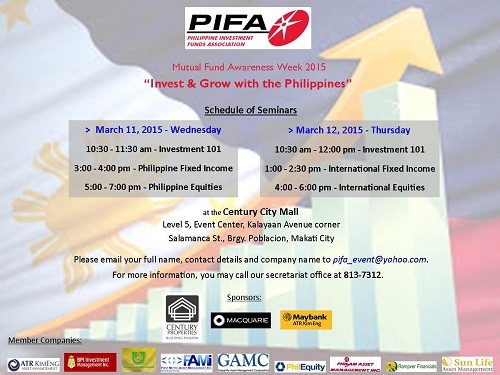Choose A Fund With A Winning Manager Yahoo She Philippines
Post on: 23 Апрель, 2015 No Comment

Ever since there have been mutual funds and fund managers, there has been a process used to select funds and managers. But, thanks to the advent of the 401(k) in 1978, what was once a process exclusively for institutional consulting firms has become a complete stand-alone industry.
The average investor can be overwhelmed by the variety of funds and, as a result, making a decision can be confusing. Companies like Morningstar and Lipper have services available to slice-and-dice funds and their managers into digestible pieces for investors of all levels to make informed decisions on whether to buy, sell or hold their funds. In this article, well take a few steps back and break down the key components of mutual funds and their managers that will help the average investor make sound decisions.
Person Behind the Fund
So who is the portfolio manager? Portfolio managers typically have similar academic credentials. Many have an undergraduate degree in business and some have chosen to follow up with graduate and doctoral degrees. They may also have various industry credentials, the standard of which is the Chartered Financial Analyst (CFA) designation.
The CFA is a progressive three-stage examination process that leads its candidates through all aspects of accounting, economics, securities analysis and portfolio management. While some managers have crossed over to the Certified Financial Planner (CFP) program, the CFA differs from the CFP. The CFP is a designation for those who work with individual investors. The program curriculum includes in-depth coverage of topics such as insurance and estate planning, which are not covered by the CFA program. Neither designation is required, but both are considered to be exceptional and respected .
The portfolio manager previously may have been a securities analyst whose role was to research and select securities to be purchased by portfolio managers. While some companies separate those roles, a portfolio manager may have dual roles acting as the portfolio manager and analyst. While there is no official requirement for experience, the portfolio manager usually has at least five years of industry experience.
Portfolio Managers Role
In The Wizard of Oz, the wizard remained hidden behind a curtain and few were allowed to see him. In the world of mutual funds, people rarely get to peek behind the curtain to see how everything works behind the scenes. The main duties of the portfolio manager are to select securities to purchase, determine which ones to sell, and rebalance the portfolio in conjunction with the funds buying, selling, contributions and redemption activity. Selecting securities to buy and sell can be in conjunction with the analysts recommendation and determined either independently or along with the help of an investment committee. Depending on the structure and size of the fund, the portfolio manager may be part of a team managing the fund or may be the sole portfolio manager.
Portfolio managers jobs carry a heavy burden; they tend to be heralded when the fund performs well and attacked when the fund performs poorly. The portfolio manager is often called on to provide commentary to the funds investors, discussing the economy, the economic outlook, the fund itself or even politics. However, fund managers are not allowed to reveal the actual holdings of the fund as there are specific rules regarding when that information can be released.
Investment Strategy and Process
In selecting any investment, there are some very basic premises that need to be researched prior to investing. The fund should be analyzed for:
- How easy it is to understand
- Its consistency
- Its definability
- Its soundness
First and foremost, the investment process should be easy to understand. Some of the most famous investors like Warren Buffett have said that if you cant understand what you are investing in you probably should not invest in it. As simple as it sounds, it is an important starting point.
It may take a little work, but tracing the investment process back in time will determine whether the funds manager is consistent with his or her strategy. For example, making major changes in a philosophy as the tastes of investors change may indicate a manager who chases trends. The confusion can be magnified by the dizzying array of mutual fund names like Select Intermediate Growth Opportunities Fund or the International Direct Select Diversified Balance Fund. While the mutual fund manager who bends his or her sails to the wind trying to cash in on the latest trend may be successful over short periods, it requires outstanding foresight and a bit of luck to call the tops and bottoms of those trends.
It is also important to verify that the strategy is definable. For example, can you peg the manager and the fund to the specific role you have hired them to do? If not, you may be investing in a fund whose manager exercises more autonomy than you would like to see.

Lastly, does the fund have a sound strategy? Read the strategy thoroughly and evaluate the soundness of its goals. If the strategy is based on theory alone and is relatively new, it is important to make sure its right for you.
Even though there is extensive information available to evaluate mutual funds and their managers from multiple aspects, it is human nature to pick the fund that performed the best in the most recent time period. This is unfortunate, as this months best performing funds can easily be the worst performing funds next month. Then human nature kicks in again and the reflex reaction is to sell the fund. This leads investors to a predictable trap of buying high and selling low.
One way to avoid the trap of investing in the wrong fund is to look at:
- Consistency
- Relative versus absolute performance
- Peer performance
- Performance over cycles
- Personal investment
Consistency can easily be determined by counting the number of times the manager has done well compared to other managers. This measures absolute performance and is a good first step in performance evaluation.
The next step is to evaluate relative performance, which compares a funds absolute returns to indexes and peer groups. This applies to all funds investing in all asset classes, as each class has specific benchmarks and peer groups. For example, domestic large cap stocks are usually compared to the S&P 500 as a benchmark and then to peer groups such as growth or value sub-universes.
International bond funds may be benchmarked against a Shearson Lehman Intermediate Bond Index and then ranked in a sub-universe of developed or emerging market managers. The key here is to dig deeper to find out how closely the fund is following the process it has set out to follow. It may raise a red flag if a fund manager has outperformed his or her benchmark consistently, but has achieved returns with a low correlation to the returns of the benchmark. This would warrant further research to see how the manager achieved those results.
The outcome will most likely be one of two things:
- The mutual fund manager exhibited superior security selection or market timing skills, or
- The manager strayed from his or her process on occasion to follow trends.
Either way, whether to invest in this type of fund might be a matter of personal preference; some people would like the free spirit while others prefer a regimented process.
While comparing fund performance, it is also a good idea to evaluate how a manager has done in various market cycles. This will help the investor determine whether the manager does particularly well in good markets, bad markets or both.
Finally, investors should remember to consider one of the most overlooked items: does the mutual fund manager invest his or her own money in the fund? While this may not matter for some investors, it is sure nice to know that the manager has some of his or her own dough in the mix.
The Bottom Line
The industry of evaluating mutual funds and their managers has grown as fast as the mutual fund business. Theres an overwhelming amount of information available to investors, but there are ways to simplify the process and evaluate the manager based on credentials, experience, process and performance in various market cycles. The key to evaluating and investing is to not rely solely on the rating agencies and to do your own research. You might be surprised to find that you know a lot more than you thought.
More From Investopedia














